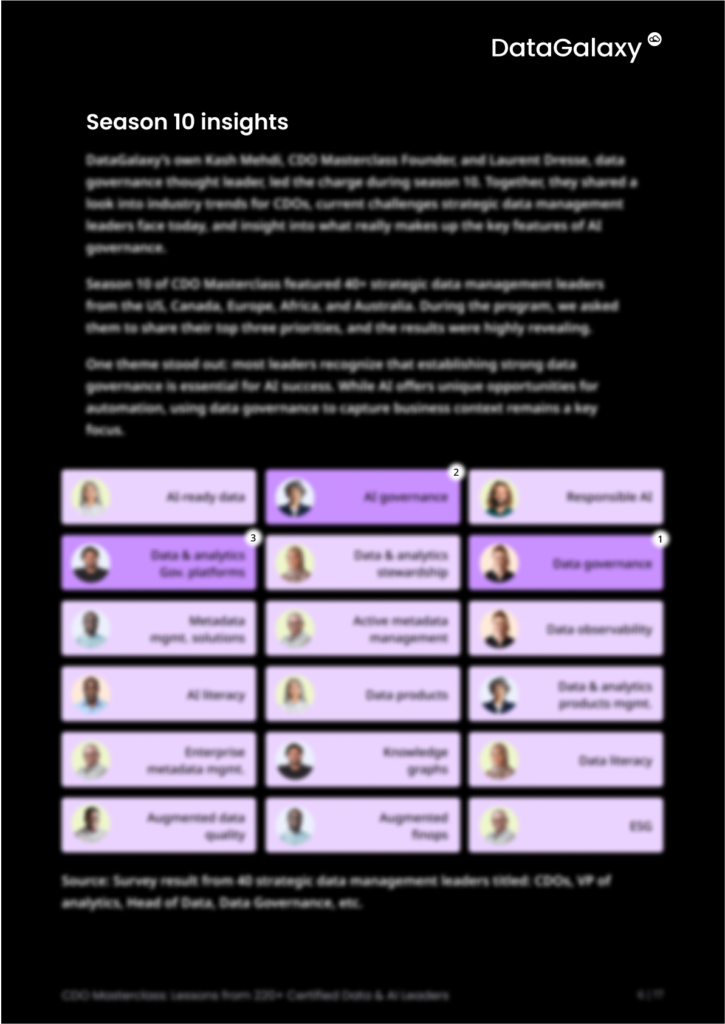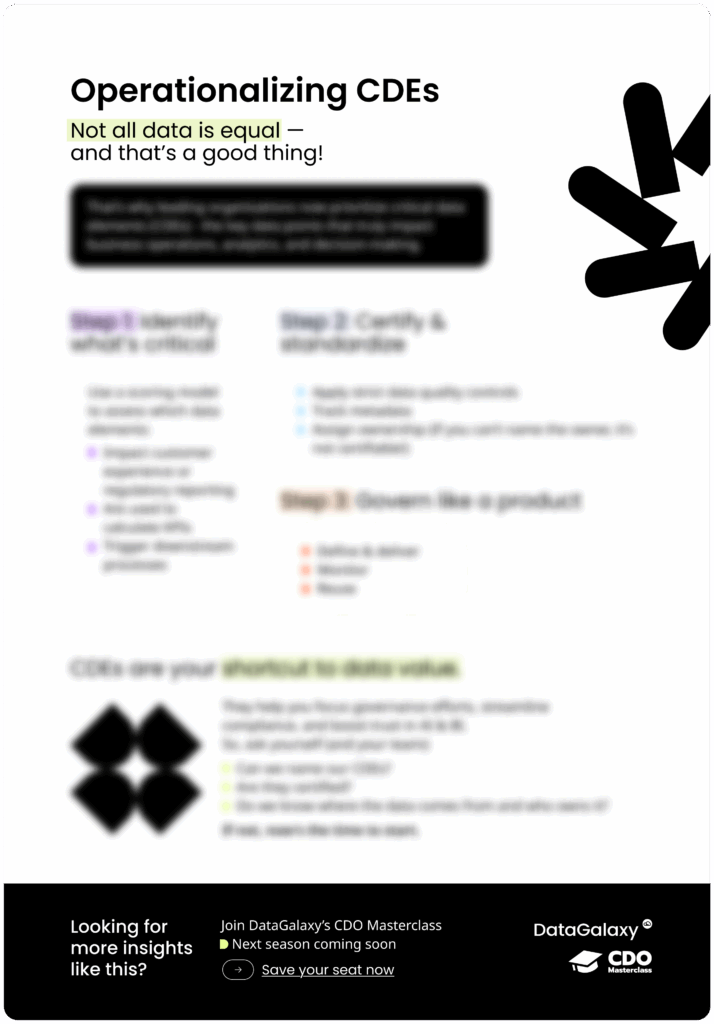
Data governance in 2026: Benefits, business alignment, and essential need
In a world where data has become more vital than ever, understanding how to effectively manage and utilize this resource is essential.
One approach that continues to gain attention is data governance.
The benefits of data governance can impact an organization at multiple levels by driving better decision-making, improving operational efficiency, and fostering regulatory compliance.
TL;DR
Data governance has evolved from an IT-driven initiative into a core pillar of enterprise data & AI strategy.
In 2026, organizations rely on structured, governed, high-quality data to enable operational efficiency, regulatory compliance, trustworthy analytics, and AI-driven innovation.
This article explores the seven major benefits of data governance, explains how aligning governance with business objectives unlocks greater value, and outlines why platforms like DataGalaxy are essential for scaling Data & AI Product Governance across the organization.
In this article, we’ll explore the top benefits of data governance in 2026 and how aligning governance with business line objectives maximizes ROI and accelerates digital transformation.
Why business alignment is the foundation of modern data governance
Aligning data governance with business objectives
To unlock the full strategic value of data, governance must be aligned with each business line’s goals and operational realities.
When governance is disconnected from business needs, adoption suffers, data quality erodes, and the enterprise misses opportunities for value creation.
A strong data governance program supports:
- Data-driven decision-making
- Efficient operations and automation
- Risk and compliance management
- AI readiness and trustworthiness
- A unified, cross-functional data culture
This alignment is now a requirement for organizations building a modern data & AI strategy.
Understanding business line objectives
Each business line (Sales, Marketing, Finance, HR, Product, Operations, Risk, etc.) has unique KPIs and data dependencies:
- Sales focuses on pipeline accuracy, revenue forecasting, and customer insights
- Finance prioritizes data accuracy, compliance, and reporting integrity
- Marketing depends on segmentation, real-time audience analytics, and attribution models
- Operations requires visibility into processes, systems, and performance indicators
To support these goals, data leaders must understand:
- What data each business line uses
- Where that data originates
- How decisions are made with it
- Where data literacy or accessibility gaps exist
- What risks or compliance requirements must be addressed
This foundational knowledge ensures governance is practical, relevant, and impactful.
Customizing governance initiatives
No two business lines operate the same so governance cannot be one-size-fits-all.
Effective governance requires:
- Assessing each business line’s data maturity
- Identifying key stakeholders
- Clarifying data owners, stewards, and custodians
- Documenting critical data elements (CDEs)
- Understanding required reports, dashboards, and analytics
- Mapping pain points such as:
- Difficulty finding data
- Lack of trust in definitions
- Missing lineage or unclear ownership
- Data quality issues
- Security or compliance risks
With this information, organizations can tailor policies, build role-based workflows, and implement governance tools that match each team’s environment.

The 3 KPIs for driving real data governance value
KPIs only matter if you track them. Move from governance in theory to governance that delivers.
Download the free guidePrioritizing high-value data assets
Not all data is equal. Governance should begin with the datasets that:
- Drive revenue
- Support major KPIs
- Influence decision-making
- Have regulatory or security implications
- Power AI models or automated processes
- Affect customer experience
By prioritizing high-value data assets, organizations ensure governance resources deliver the highest impact first.
Ongoing refinement is essential as new sources emerge, business KPIs shift, and AI workloads introduce new data requirements.
Enabling cross-functional collaboration
Data governance succeeds only when both data teams and business teams participate.
Effective collaboration includes:
- Clear communication channels
- Data literacy training
- Governance workshops
- Participatory policy creation
- Embedding data experts inside business lines
- Assigning Data Product Owners for domain-level responsibility
Cross-functional alignment increases the adoption of governance tools, reduces friction between teams, and accelerates the creation of trusted, high-quality data products.
Leveraging a data catalog for governance success
A modern data governance strategy is impossible without the right technology.
A data catalog like DataGalaxy enables organizations to:
- Centralize metadata
- Visualize lineage
- Map business terms and definitions
- Assign ownership and stewardship
- Reduce silos
- Improve data literacy
- Build trust in enterprise data
- Support AI transparency and explainability
With a catalog, teams can finally understand, trust, and operationalize the data that fuels their business.
Unlock the playbook of 220+ data & AI leaders
Learn the secrets shared over 10 seasons of CDO Masterclass, DataGalaxy’s premier online and in-person learning experience.
Download the white paper
Seven major benefits of data governance in 2026
1. Improved data quality
Improved data quality remains the most recognized benefit of effective governance. A consistent framework ensures data is:
- Accurate
- Complete
- Consistent
- Timely
- Reliable
These qualities support:
- Better operational decisions
- Stronger analytics
- Clearer KPI reporting
- More effective Data Products
- Higher AI model performance
Quality data is the foundation that enables the rest of your digital and AI initiatives.
2. Enhanced decision-making
Good decisions require good data. Data governance ensures that leaders, analysts, and AI systems rely on:
- Trusted, standardized definitions
- Consistent metrics
- Reliable lineage
- Governed access
This reduces the “garbage in, garbage out” problem and enables:
- Confident strategic decisions
- Faster insights
- Performance tracking across departments
- Reduced dependency on shadow IT or manual spreadsheets
Organizations with strong governance evolve into truly data-driven enterprises.
3. Stronger regulatory compliance
Regulations such as GDPR, CCPA, HIPAA, and the upcoming EU AI Act require precise control and documentation of data usage.
Data governance provides:
- Policies and procedures
- Data retention rules
- Data privacy workflows
- Access control
- Audit trails
- Security measures
- Automated compliance reporting
This minimizes the risk of:
- Fines
- Operational interruptions
- Reputational damage
Compliance becomes a natural outcome of good governance.
4. Increased operational efficiency
Governance reduces operational friction by eliminating:
- Duplicated efforts
- Conflicting data sources
- Manual reconciliation
- Shadow databases
- Definitions mismatches
Governed organizations operate with:
- A single source of truth
- Faster workflows
- Reduced overhead
- Clear accountability
- Higher automation readiness
The efficiency gains compound over time, delivering measurable ROI.
Operationalizing
CDEs
Do you know how to make critical data elements (CDEs) work for your teams?
Get your go-to guide to identifying and governing critical
data elements to accelerate data value.

5. Better risk management
Data governance improves visibility into:
- Who accesses data
- Which systems depend on it
- How it flows across the enterprise
- Where vulnerabilities exist
This supports proactive risk mitigation related to:
- Data breaches
- Security weaknesses
- Regulatory exposure
- AI model bias or drift
- Operational breakdowns
Governance strengthens organizational resilience in an increasingly complex data landscape.
6. Improved data security
Governance frameworks define:
- Access standards
- Security controls
- Data handling requirements
- Encryption policies
- Access monitoring
- Incident response procedures
By controlling and monitoring data usage, organizations reduce breach risks and increase security posture—essential for customer trust and AI reliability.
7. Greater return on investment (ROI)
Organizations that invest in structured governance consistently observe:
- Lower operational costs
- Fewer data errors
- Faster insights
- Stronger marketing and sales performance
- Reduced compliance spending
- Higher customer satisfaction
- Stronger AI model outcomes
Governance becomes a multiplier that enhances the value of every Data & AI initiative.
Why is DataGalaxy the best solution for modern data & AI governance?
DataGalaxy is the industry’s leading Data & AI Product Governance Platform, designed for organizations that want to transform how they understand, govern, and activate their data.
Key capabilities include:
- Data Knowledge Catalog
- AI Governance Framework (lineage, explainability, transparency)
- Data Products & Domains modeling
- Business Glossary
- Metadata management
- End-to-end lineage visualization
- Data quality rules and ownership workflows
- Collaboration tools for stewards and stakeholders
- Integrations across the modern data stack (Snowflake, Databricks, dbt, Power BI, etc.)
DataGalaxy enables:
- Faster value creation
- Higher adoption of governance across the enterprise
- Increased trust in business data
- Stronger AI outcomes
- Full visibility over the Data Product lifecycle
Organizations worldwide choose DataGalaxy to operationalize data governance at scale.
DataGalaxy’s Campaigns
DataGalaxy’s Campaigns ensure rapid deployment, expert management, and enhanced collaboration through customized workflows
Learn moreThe benefits of data governance extend beyond simply managing data.
They translate into improved business operations, increased trust, better compliance, and enhanced financial performance.
In the digital age, where data has become a key strategic asset, implementing a robust data governance framework is not just an option but a necessity for organizations seeking to thrive.
FAQ
- What is data governance?
-
Data governance ensures data is accurate, secure, and responsibly used by defining rules, roles, and processes. It includes setting policies, assigning ownership, and establishing standards for managing data throughout its lifecycle.
- Why is data governance important?
-
Data governance brings clarity and consistency, ensuring everyone uses and understands data the same way. It’s not just about control—it fosters collaboration, trust, and smarter decisions, turning data into a strategic asset that fuels innovation and growth.
- How do I start a data governance program?
-
To launch a data governance program, identify key stakeholders, set clear goals, and define ownership and policies. Align business and IT to ensure data quality, compliance, and value. Research best practices and frameworks to build a strong, effective governance structure.
- What is AI governance?
-
AI governance is the framework of policies, practices, and regulations that guide the responsible development and use of artificial intelligence. It ensures ethical compliance, data transparency, risk management, and accountability—critical for organizations seeking to scale AI securely and align with evolving regulatory standards.
- Why is AI governance important?
-
AI governance is crucial because it ensures that artificial intelligence systems are developed and deployed responsibly. Without proper governance, AI can perpetuate biases, compromise data privacy, and make opaque decisions that affect individuals and society. Effective AI governance establishes frameworks and policies that promote ethical use, transparency, and accountability in AI applications.
Key takeaways
- Data governance is essential for data & AI strategies in 2026.
- Aligning governance with business objectives drives maximum impact.
- A modern data catalog is critical for visibility, trust, and collaboration.
- Governance improves data quality, security, compliance, and efficiency.
- DataGalaxy provides the leading end-to-end platform for Data & AI Product Governance.

